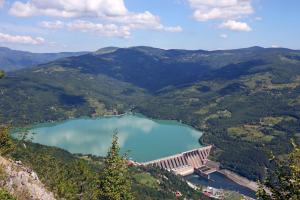Originally introduced in policy and development discussions in 2011, the water-food-energy-ecosystem nexus approach has evolved into a pivotal framework for sustainable development and achieving the Sustainable Development Goals (SDGs).
Work on the water-energy-food-ecosystems nexus under the Water Convention started in 2013, with the development of a methodology to analyse cross-sectoral linkages – essentially resource management trade-offs and synergies — in transboundary settings in order to reconcile multiple water uses and facilitate cooperation.
The Task Force on the Water-Food-Energy-Ecosystems Nexus was established to guide the development and application of this methodology. The methodology has since been used in close cooperation with national administrations to assess six transboundary river basins and one shared aquifer, leading to the establishment of partnerships promoting cross-sectoral, transboundary cooperation in different contexts.
The eighth meeting of the Task Force on the Water-Food-Energy-Ecosystems Nexus convened on December 7-8, 2023, in Geneva, marking a significant milestone with this decade of dedicated cross-sectoral work under the Water Convention.
Over 200 participants engaged in the session, either in-person or virtually, including policymakers representing 46 UN member states, experts from 77 countries, more than 50 international organizations, basin organizations, and NGOs working on sustainability, water, energy, and environmental issues as well as academia. The broad global engagement reflects the wide recognition of the water-food-energy-ecosystem nexus approach, and its importance for sustainable development and transboundary water cooperation.
The Task Force reaffirmed the commitment to adopt integrated, holistic approaches to development, recognizing the interconnected nature of water, land, energy, and nature management. High on the agenda of the Task Force meeting was the reflection on work accomplished thus far and discussions on future activities, featuring insights from countries, river basin organizations, academics, project managers, donors, and partners. Key agenda topics included financing cross-sectoral solutions, the role of transboundary water cooperation in the energy transition, with a focus on sustainable hydropower, and water allocation in transboundary contexts.
Simultaneously, as global leaders convened in Dubai for the annual UN conference on climate change (COP28), the Task Force underscored the need to mainstream the nexus approach in global climate and environmental processes of cooperation.
The anniversary of the nexus was not only a time for reflection but also a pivotal moment to shape the future. Participants engaged in dynamic small group discussions, actively contributing to the collective effort to shape the work of the Task Force in the upcoming Programme of Work 2025-2027 under the Water Convention.
The Task Force meeting was held back-to-back with the Global workshop on Funding and Financing Transboundary Water Cooperation and Basin Development (5-6 December 2023), which represented an important step toward building a sustainable financial framework for transboundary water cooperation and basin development, fostering collaboration and building bridges among countries, organizations, international financial institutions and private sector actors committed to ensuring a water-secure future. The role of cross-sectoral cooperation in diversifying financing sources was also discussed during the Task Force meeting.
The success of the Task Force meeting is attributed to the leadership of the lead party, Finland, and the collaborative spirit of partners, including: Food and Agriculture Organization (FAO), Economic and Social Commission for Western Asia (ESCWA), Economic Commission for Latin America and the Caribbean (ECLAC), United Nations Department of Economic and Social Affairs (DESA), German Agency for International Cooperation (GIZ), Global Water Partnership (GWP), Global Environment Facility (GEF), International Union for Conservation of Nature (IUCN), Organisation for Economic Co-operation and Development (OECD), Royal Institute of Technology, Sweden (KTH) and other contributors.


